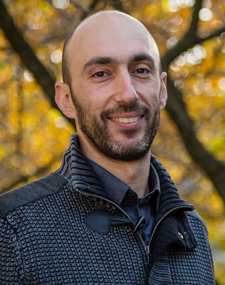Mark Rudner receives ERC grant of nearly 12 million kroner
Mark Rudner, associate professor in Condensed Matter Physics at the Niels Bohr Institute at the University of Copenhagen, has received a grant from the European Research Council, an ERC Starting Grant. The grant of 1.5 million Euro (approx. 12 million kroner) is for five years.

Mark Rudner, associate professor in Condensed Matter Physics at the Niels Bohr Institute, has received an ERC Starting Grant of approx. 12 million kroner
Mark Rudner works with quantum technology and he describes quantum technology as the exploration of a whole new world – a world that has progressed rapidly since Niels Bohr introduced his groundbreaking atomic model just 100 years ago, which forms the basis for our understanding of the quantum revolution.
“Where the 20th century was about exploring the fundamental laws of quantum mechanics, the 21st century will be about pushing the laws to new limits and learning to control them,” he says, and that is precisely what he is working on.
Mark Rudner is working across different areas of physics – from theoretical quantum physics to the physical properties of complex systems. Quantum physics is the branch of physics that deals with the properties of matter at the atomic level, while substances with many particles, e.g. electrons in semiconductors, may behave like a single particle with completely new properties. When he talks about his research, you can clearly tell that he is really passionate about what he does. He wants to help push quantum physics to entirely new frontiers.
“One of the central topics of my research is to find new ways to control complex quantum systems, which could open new doors for quantum technology. However, this requires the development of materials with specific new properties, which is a huge challenge. The idea is instead to exploit that developments in experimental physics have led to new opportunities for the dynamic control of complex quantum systems using lasers and powerful microwave sources. So these tools might be used to realise new phenomena in the materials we already know about,” explains Mark Rudner.
With the ERC grant, Mark Rudner will be able to expand his research group with five new positions.
 Mark Spencer Rudner, Associate Professor, Condensed Matter Physics, rudner@nbi.ku.dk
Mark Spencer Rudner, Associate Professor, Condensed Matter Physics, rudner@nbi.ku.dk
